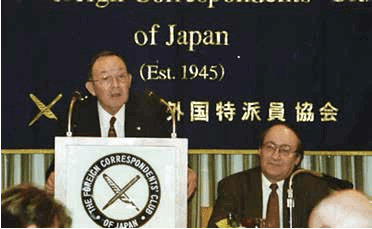Issue:

Chalmers Johnson speaks about the US-Japan relationship at the FCCJ on Dec. 7, 1998. Seated to his left is Bob Neff (Business Week). As a scholar specializing in China and Japan, Johnson was noted for putting the term “developmental state” into perspective with his 1982 book titled MITI and the Japanese Miracle: The Growth of Industrial Policy, 1925–75. That book described the policies and direct influence of Japanese bureaucrats on the country’s successful economic development.
Johnson was born in Phoenix, Arizona, on Aug. 6, 1931, and received his higher education at the University of California, Berkeley. After serving in the US Navy as a communications officer during the Korean War, he returned to Berkeley to earn his M.A. and Ph.D. degrees. He then taught political science at Berkeley from 1962, served as the Director of the Center for Chinese Studies from 1967 to 1972, and chaired the Political Science Department, retiring from the University of California, San Diego, in 1992 as a professor emeritus. He was also a Fellow of the American Academy of Arts and Scientists from 1976 and in 1994 became the co-founder of the Japan Policy Research Institute.
Johnson’s work on the developmental state was later rivalled by his trilogy on the consequences of US foreign policy that began in 2004 with Blowback: The Costs and Consequences of American Empire and The Sorrows of Empire: Militarism, Secrecy, and the End of the Republic in the same year. These two books were followed by Nemesis; The Last Days of the American Republic in 2007 in which he also describes his work as an outside consultant to the CIA from 1967 to 1973, a position that he says was abolished during Nixon’s second term to prevent influence by outsiders on the National Intelligence Estimates (NIE).
The Blowback series basically criticized the US failure to reduce its international military posture to one of basic self-defense following the collapse of the Soviet Union, thus creating a new form of global empire with its vast system of military bases around the world. His last major book, Dismantling the Empire; America’s Last Best Hope, was published in 2010. He also wrote articles for several major publications and was often interviewed on radio and TV programs.
Chalmers Johnson died at the age of 79 on Nov. 20, 2010.
– Charles Pomeroy
editor of Foreign Correspondents in Japan,
a history of the Club that is available at the front desk

